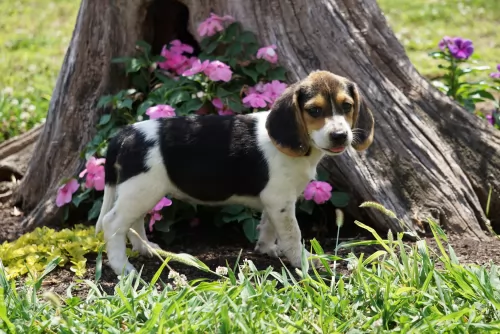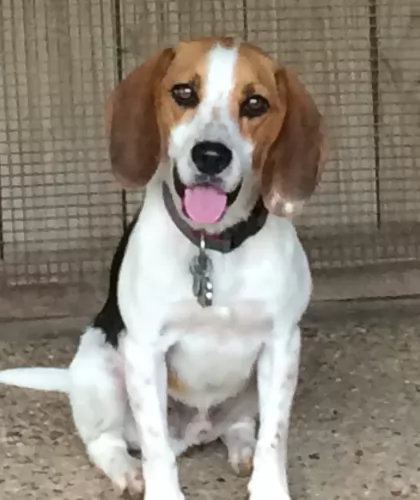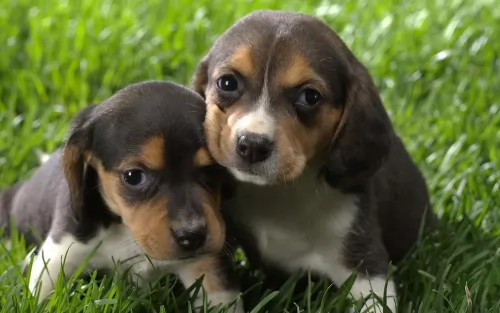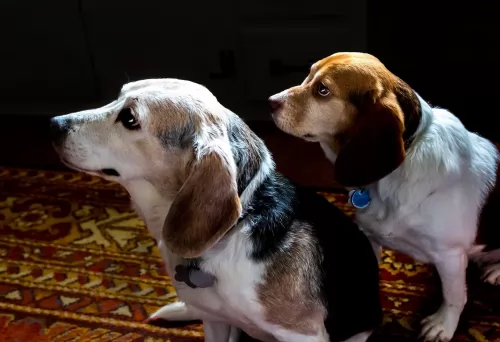 Petzlover
PetzloverBeagle is originated from United Kingdom but Russian Setter is originated from Russia. Beagle may grow 27 cm / 10 inches shorter than Russian Setter. Beagle may weigh 21 kg / 46 pounds lesser than Russian Setter. Both Beagle and Russian Setter has almost same life span. Beagle may have more litter size than Russian Setter. Beagle requires Low Maintenance. But Russian Setter requires Moderate Maintenance
 There are some accounts of similar size dogs used for hunting in Greece in 5th century BCE. During 8th century the Talbot Hound breed was created. In 11th century Talbot Hound was brought to England by William the Conqueror. While using in hunting they are found to be a slow runner. To overcome the situation and increase their running speed the hunting people bred Talbot Hound with Grey hounds. The beagles described earlier were very small in size and are said as pocket beagles.
There are some accounts of similar size dogs used for hunting in Greece in 5th century BCE. During 8th century the Talbot Hound breed was created. In 11th century Talbot Hound was brought to England by William the Conqueror. While using in hunting they are found to be a slow runner. To overcome the situation and increase their running speed the hunting people bred Talbot Hound with Grey hounds. The beagles described earlier were very small in size and are said as pocket beagles.
People often think it is ridiculous that a Setter dog comes from Russia. It is believed that the Russians did have some kind of Griffon and the word Pointer is also often translated as Setter.
It is believed that the Russian Setter is one of the ancestors of the Wire-haired Pointing Griffon and that it possibly shared an ancestry with the German wire-haired and broken-haired pointers.
References to Russian Setters were fairly common in the 19th century, but there is such contradictory information that it is hard to get good information on the dogs. The Russian Setter is believed to have existed before the Russian Revolution resembling the English Setter. Dog experts tell us the dog no longer exists.
 They are small and compact breed, and always happy and fun loving. They should be trained by patient and creative training techniques. Beagles are very much interested in using their nose in finding interesting scents and are food focussed. They always wake their neighbours at 6 am by their half howling. They think everyone is their best friend and love to have friendship with other animals and humans. They have about 220 million scent receptors and are said as "a nose with feet" by humorist Dave Barry.
They are small and compact breed, and always happy and fun loving. They should be trained by patient and creative training techniques. Beagles are very much interested in using their nose in finding interesting scents and are food focussed. They always wake their neighbours at 6 am by their half howling. They think everyone is their best friend and love to have friendship with other animals and humans. They have about 220 million scent receptors and are said as "a nose with feet" by humorist Dave Barry.
We can see beagles at many airports in their duty. They can easily trace out the illegal things being smuggled. Since they are small in size they are suitable for apartment living. But they like to walk around several times. They should be exercised for plenty of time. Obedience training should be given to them by giving food reward. Beagles are wanderers of nature and so if possible they will try to escape. So it is necessary to make them microchipped or to wear a collar, to find them easily.
In terms of appearance, it was John Henry Walsh who said that the Russian Setter was a dog hidden by its long, woolly matted coat.It seems to have been a medium sized dog with an elegant appearance. It seems the dog came in two varieties - the curly coated liver coated dogs and the fawn colored dogs which are straight coated.
Because there is very little information on these dogs, we assume they were between 57 – 68cm in height and between 27 and 32kg in weight. The coat was no doubt in colours such as grey, reddish-brown with some black and white and shortish and wiry. The ears were floppy,and the face no doubt had some longer hair around the muzzle.
Nobody seems to know exactly what the temperament of this dog was, but when you look at some of his ancestors you can assume that he was strong-willed, confident and a skilled hunter.
He would have required a lot of exercise too. He was lively and energetic. Because he had Pointer in him you can be sure that he would have been intelligent so that he could be trained and socialized.
He would have been keen to learn with an owner who was firm and consistent in his treatment of him. He is a dog most happiest when he can spend time with his human family, a most loyal and devoted family friend, capable of getting on well with children and pets in the home.
 They are very good companion for children. They love to play and spend time with children.
They are very good companion for children. They love to play and spend time with children.
They have millions of scent receptors and so they can be seen in Airports and many important places in duty. Also they are interested in hunting small rodents.
They adapt well for apartment living but they don't like being alone for a long time. If kept alone for a long time in back yard they will begin to bark and dig pit or try to escape. Beagle likes hot weather more than cold weather.
Beagles are difficult to train up. Many people say it will take about one year to house train beagles. They have an attitude of "what's in it for me". But it depends on the personality and temperament of the individual.
It appears, according to records that the Russian Setter has come and gone. However he would have been a calm, gentle pet with running ad hunting keeping him happy. He would therefore have required a lot of exercise.
We can assume that according to the few records that there are, that this was an affable, pleasing dog breed which made a great family pet.
 Beagle's ears should be checked occasionally for any sign of infections like discoloured wax, dirt or foul odour. Also their nails should be trimmed regularly. They should be exercised regularly in order to maintain a proper weight. The most common health problems in beagles are obesity, epilepsy and allergies.
Beagle's ears should be checked occasionally for any sign of infections like discoloured wax, dirt or foul odour. Also their nails should be trimmed regularly. They should be exercised regularly in order to maintain a proper weight. The most common health problems in beagles are obesity, epilepsy and allergies.
They are average shedders and having short hair thus it is easy to groom. They should be made to bath with a mild and non irritant shampoo.
The Russian Setter had an average lifespan of 10 – 14 which is a fairly good innings for a dog. Nonetheless you would have had to be aware of some common dog problem. These dogs were prone to major health issues such as both hip and elbow dysplasia, deafness, epilepsy and hypothyroidism.
The thyroid glands produce hormones that affect the function of many parts of the body. Dogs with this illness have a low production of thyroid hormones.
This disease is mainly caused by inflammation or shrinkage of the thyroid gland. The most common signs of low thyroid in dogs is thinning of the fur, the coat is dull, there is weight gain and excess shedding. The dog doesn’t tolerate cold well either. These dogs also often have ear infections.
 After 4 weeks of birth the puppy can be given solid foods by slowly increasing the ratio for many weeks. The recommended food is fresh meat of chicken breast, lamb, turkey and lean hamburger. The vegetables can be given as raw or steamed. The vegetables that will be good for them are raw baby carrots, broccoli, cauliflower and sweet peas. The puppies should be fed 3 to 4 small meals per day as they require more nutrients for their growth.
After 4 weeks of birth the puppy can be given solid foods by slowly increasing the ratio for many weeks. The recommended food is fresh meat of chicken breast, lamb, turkey and lean hamburger. The vegetables can be given as raw or steamed. The vegetables that will be good for them are raw baby carrots, broccoli, cauliflower and sweet peas. The puppies should be fed 3 to 4 small meals per day as they require more nutrients for their growth.
The grown up dog should be fed with the same food and 1 complete meal is enough for them. The meal should be given at noon. The food should be given based on calories as they should not get overweight. In addition to food, fruits such as blueberries, raspberries, banana and mango can also be given to them periodically.
Beagles should be exercised daily in order to maintain proper weight. Beagles are average shedders and having short hair which is easy to groom. They should be made to bath periodically with a mild shampoo.
Moderate exercise such as walking and cardio exercise such as chasing a ball should be given to them for staying them to be active and for maintaining good health.
Whatever kind of coat the Russian Setter ad it would have required a brushing twice a week to keep it in top form.
The medium length floppy ears would have to be checked inside for ear infection.
His owners would have checked inside the mouth for any signs of rotten or bad teeth.
His nails would have required trimming.
Dogs need the best food there is to stay healthy. The Russian Terrier, if it were still around today, would have had the best commercially manufactured food there was.
You want to provide dogs with some good homemade food too. Dogs thrive on simplicity and consistency to avoid upsetting the stomach. Some home-cooked food such as boiled chicken, sweet potatoes, brown rice or pasta, carrots and spinach would be perfect for him. Chop the food up finely and add it into the dry kibble once or twice a week. Raw meat should also be added in when possible to promote good skin health.
Make sure your pet is never without a constant supply of fresh, cool water.